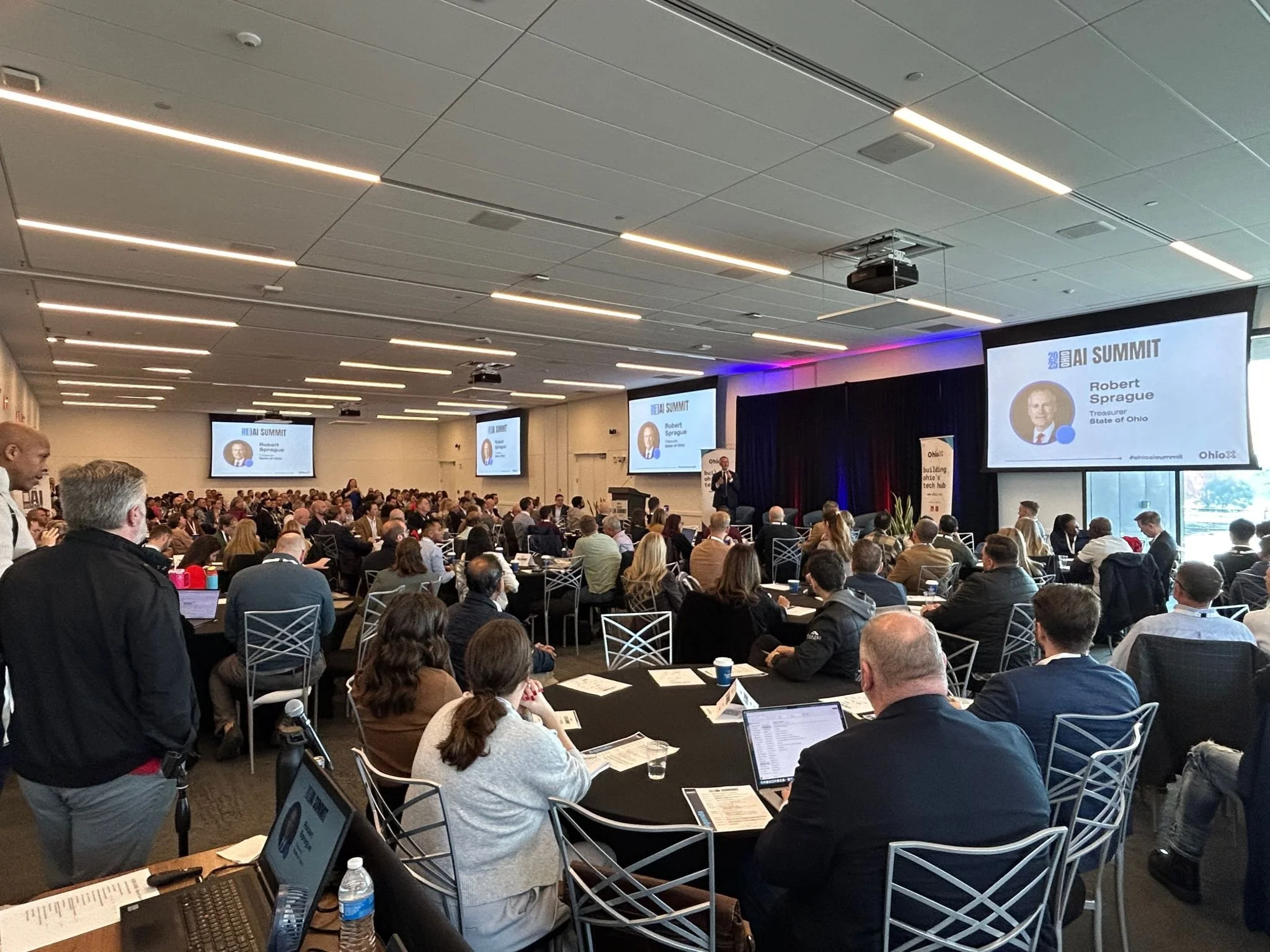Ohio leaders gather to shape the future of AI at OhioX AI Summit 2025
By Bill Magnuson
Ohio’s business, technology, and public-sector leaders came together this week for one of the most forward-looking events in the state: the Ohio AI Summit. The sold out gathering, hosted by OhioX in Columbus, made one message clear: AI is not a distant idea. It is here now, and it is changing the way companies, schools, hospitals, and government teams work every day.
The program featured keynote remarks from Ohio Secretary of State Frank LaRose and Ohio Treasurer Robert Sprague, who spoke about the role of innovation, data, and trust in strengthening Ohio’s economic future. They were joined by Nima Gard, Head of AI at Columbus-based Path Robotics, who shared how his team is using AI in real-world industrial environments and what it takes to operationalize AI inside a fast-growing company.
The Summit brought together hundreds of attendees from cloud providers and robotics companies to financial institutions, universities, and local businesses. This year’s discussions focused on how AI can be used in real life to make work faster, safer, and more effective.
AI Moves from Buzzword to Practical Tool
Speakers shared how AI has grown beyond simple chatbots or novelty tools. It is becoming something much more important, a system that helps with real tasks across many fields.
These tasks include:
Helping customers faster
Summarizing long documents
Scheduling appointments
Sorting email
Organizing company knowledge
Supporting HR and legal teams
Guiding manufacturing robots
Assisting workers in the field
AI is becoming a daily part of how work gets done, much like smartphones and the internet did in years past.
AI Agents That Do Real Work
A major topic at the Summit was the rise of AI agents, digital helpers that can follow rules, make simple choices, and take action when needed.
Unlike older chat tools, these agents can:
Register people for events
Gather information
Respond to customers
Check for errors
Review company policies
Help run routine tasks automatically
Experts explained that these digital assistants will soon work beside human teams, taking on repetitive tasks and freeing people to focus on more important decisions.
Many Organizations Are Not Ready
Even though interest in AI is high, many leaders say they are unsure how to use AI safely or effectively.
Common concerns included:
Not knowing where to begin
Worrying about mistakes
No clear rules for data and privacy
Teams unsure how to work with AI
Missing modern skills in the workforce
Old workflows that need to be updated
Speakers reminded attendees that these challenges are normal and can be solved with simple steps.
What Leaders Can Do Now - A Simple Roadmap
Experts at the Summit shared clear actions for organizations looking to start or expand their use of AI.
1. Start With Small, High-Value Tasks
Choose simple problems the organization struggles with today, such as customer follow-up, intake, internal questions, or document preparation.
2. Try a Small AI Pilot
Leaders were encouraged to build a simple prototype within days, not months. Small wins help teams understand the power of AI and reduce fear.
3. Set Basic Safety Rules
Organizations should create guidelines that protect sensitive information and define what AI is allowed to do.
4. Train Teams on How to Work With AI
Employees need time to practice, learn, and get comfortable. This includes asking questions and giving feedback.
5. Build a Culture of Curiosity
Leaders who try AI themselves set the tone. Companies that celebrate learning, not perfection, move the fastest.
Ohio Is Becoming a National Leader
Much of the Summit focused on Ohio’s strengths:
Strong mix of manufacturing, healthcare, education, and public service
Growing investment in data centers and cloud infrastructure
A community that values collaboration
Workforce programs focused on real-world skills
Leaders committed to using technology in practical ways
Ohio is becoming a place where AI is not only discussed but applied.
Looking Ahead
The Summit made it clear that organizations that begin learning and experimenting today will be stronger and more prepared in the years ahead.
For leaders who did not attend, the message was simple:
AI is here, and the most important step is getting started.
About the author
This article was created by Bill Magnuson, founder of NexusBlue, an AI and Automation Strategy company that helps organizations discover high-value AI use cases, design safe adoption plans, and connect with the right experts to drive real results.

